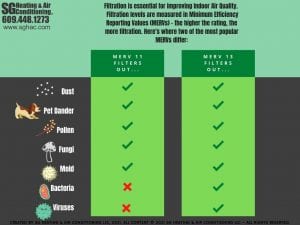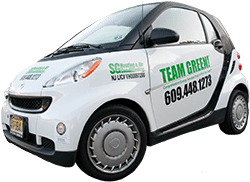April 12th, 2022

Each spring, things return that we’ve missed all winter long. Leaves, birds, flowers, you name it. But one thing we all dread is the return of seasonal allergies. Once again, allergens will be invading your home and floating around in the air you breathe. They affect some people worse than others, but no one benefits from breathing these substances in. The good news? You can take action to prevent it. Here are five pollutants to watch out for this spring and, in some cases, all year long:
Mold
Mold can grow at any time of year, and as the weather warms up and becomes more humid during the spring, conditions may become right for its growth. If mold is thriving in your home, the spores can aggravate negative health effects like allergies and sinus problems.When your AC is properly functioning, it doubles as a dehumidifier, which means decreased moisture and, as a result, less mold. This process will sometimes be insufficient, especially if the AC unit is oversized, so an Indoor Air Quality (IAQ) installation can help decrease the presence of pathogens in a home’s air even when excess moisture is present.
Dust Mites
If you think dust is nothing more than dirt, think again. Dust can contain any number of nasty ingredients: dead skin, hair, bacteria, dead insects, and pollen, to name a few. Then there are dust mites, which are living creatures that feed on dead skin and other organic materials which dust is made of. They thrive in moderate temperatures (68° – 77° F) and high humidity (70% – 80%), and can work their way into your furniture, bedding, and carpeting, and well as smaller household objects like plush toys. A properly operating AC system can help control humidity, and a high quality IAQ system can help filter out dust mite residue and other allergens.Carbon Monoxide
All fuel-fired appliances, including furnaces, water heaters, boilers, and stoves, create some Carbon Monoxide (CO). Usually, the level of CO created in the system is controlled, and will vent up the chimney safely. If the system or chimney isn’t operating properly, CO can leak inside the home, which can lead to carbon monoxide poisoning. Home CO alarms are good to have, but don’t rely on them to detect all threats. Most are designed to use a time-weighted average to reduce nuisance alarms. Even if the alarm doesn’t go off, you could still have chronic low-level CO in your home. The only way to be sure that your system is operating properly is with a service including combustion analysis from a professional technician. The technician will be able to use specialized instruments to determine whether your HVAC system’s combustion is experiencing any issues, and if there are any hazardous gases in your home’s air.Recycled Home Air
We typically think of recycling as a good thing, but if you’re not getting enough fresh air coming into your home, you may be breathing recycled air containing pollutants that have entered your home and are lingering there. One factor that can determine the quantity of these pollutants in your home’s air is how airtight your house is constructed. Airtightness is beneficial for energy-efficiency, but it has a downside: more polluted air will be trapped inside the house. A solution for controlling your home’s Indoor Air Quality, without sacrificing the energy-efficiency of your HVAC system, is an IAQ installation for your Mercer County, NJ home.Volatile Organic Compounds (VOC’s)
Volatile organic compounds can come from a variety of sources, some of which may be in your home right now. There are many cleaning products that clean surfaces but make your home’s air less clean in the process. While small amounts of VOC’s won’t usually be harmful in small doses, they can sometimes be hazardous, especially for those with COPD, asthma, and other chronic respiratory conditions. Aside from choosing all-natural cleaning products instead of chemical-based ones, the best way to control VOC’s in your home may be an IAQ installation.The Importance of Filtration
While filtration won’t have an impact on carbon monoxide, it can work wonders in keeping dust and other solid pollutants out of the air you breathe. Replace the HVAC system air filters as often as needed, and consult an HVAC contractor regarding the ideal Minimum Efficiency Reporting Value (MERV) for your home. MERV refers to how much filtration a filter provides. For a comparison of two popular MERV ratings, take a look at this infographic:
At first, it might seem like a no-brainer that you’d want the highest MERV possible, but it’s not always that simple. A MERV that’s too high will reduce an HVAC system’s airflow, hampering the system’s efficiency. That’s why it’s so important to find the best balance, a MERV that offers both maximum filtration and maximum system efficiency.
One way to enhance your Indoor Air Quality without sacrificing system efficiency is an IAQ system, which is available as an add-on to new HVAC installations or as an installation on an existing system. No matter when you add one to your home, it’s a proven method for decreasing the presence of air pollutants, a change that can have a significant impact on your overall well-being. In most cases, there’s room for improvement when it comes to Indoor Air Quality. When working together with filtration, an IAQ installation (such as a photo-catalytic installation) can significantly improve your home’s air. To learn more, contact SG Heating & Air Conditioning LLC by filling out our online form or by calling our office at 609-448-1273!
Wow, I guess it doesn’t take much to do some spring cleaning for your home’s air. Now if only it was that easy to clean out the attic! Woof!

All Content © 2022 SG Heating & Air Conditioning LLC – All Rights Reserved


